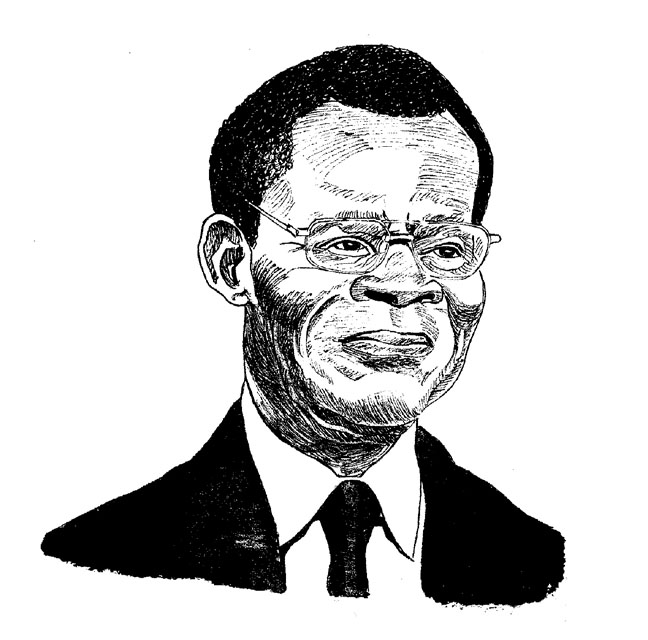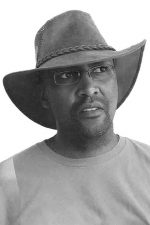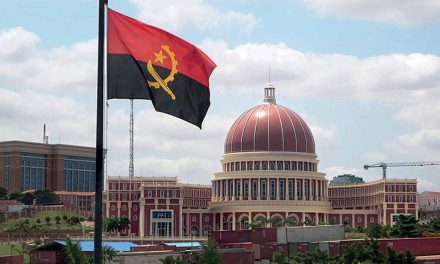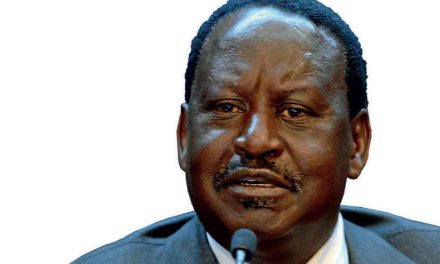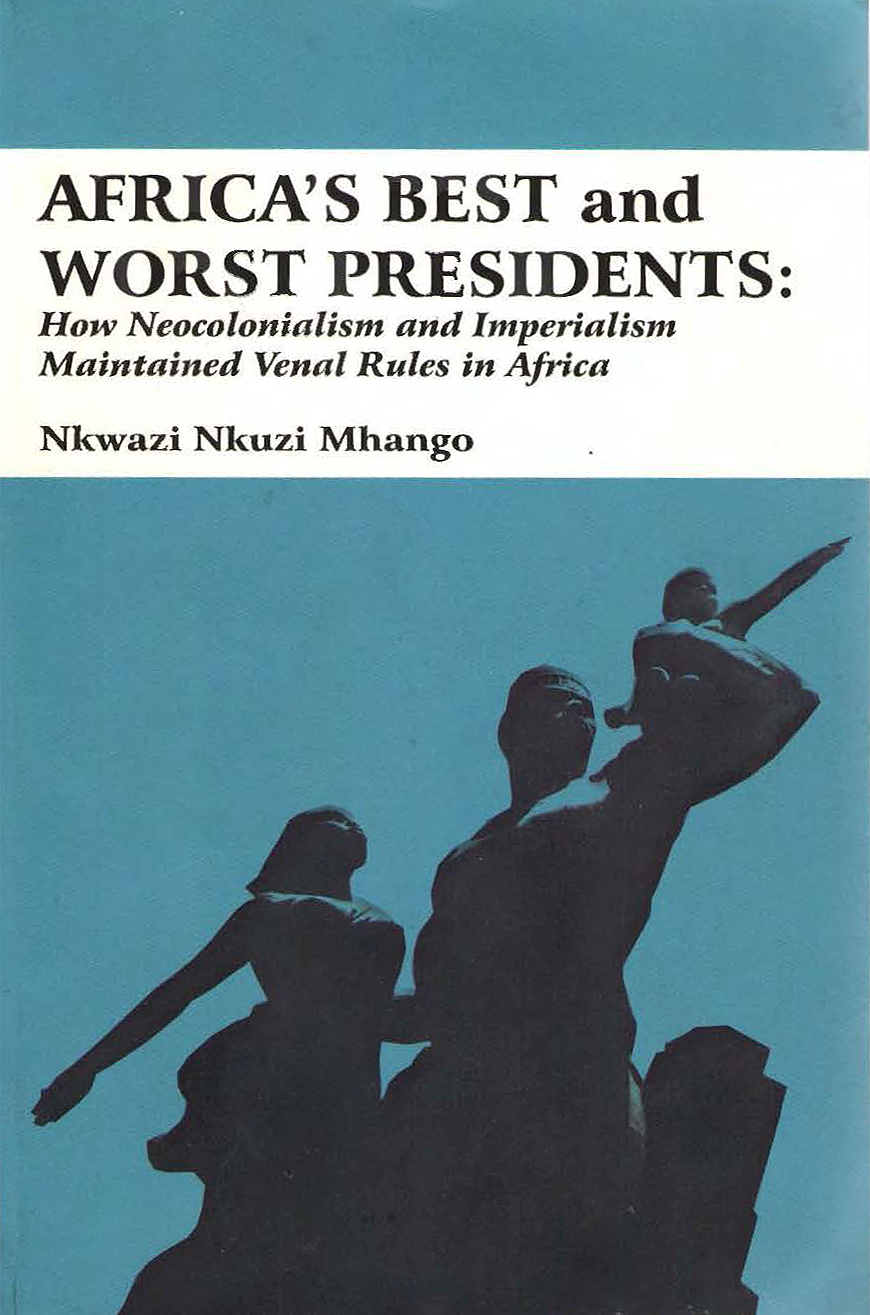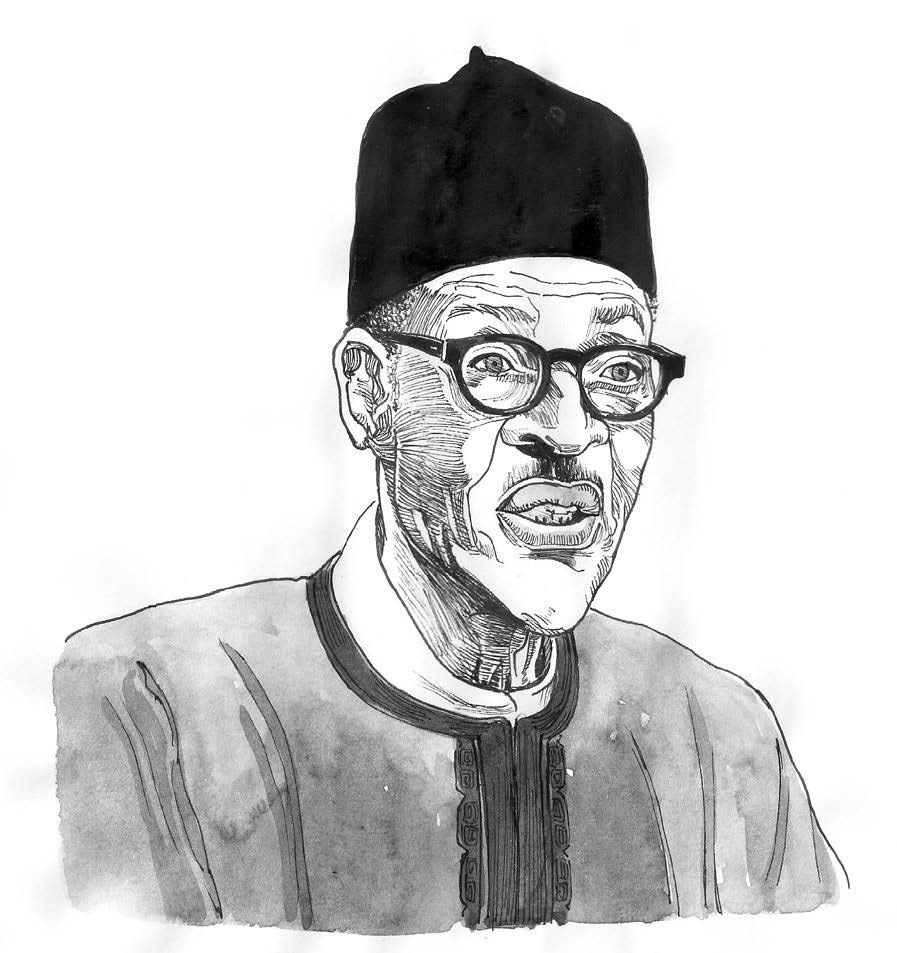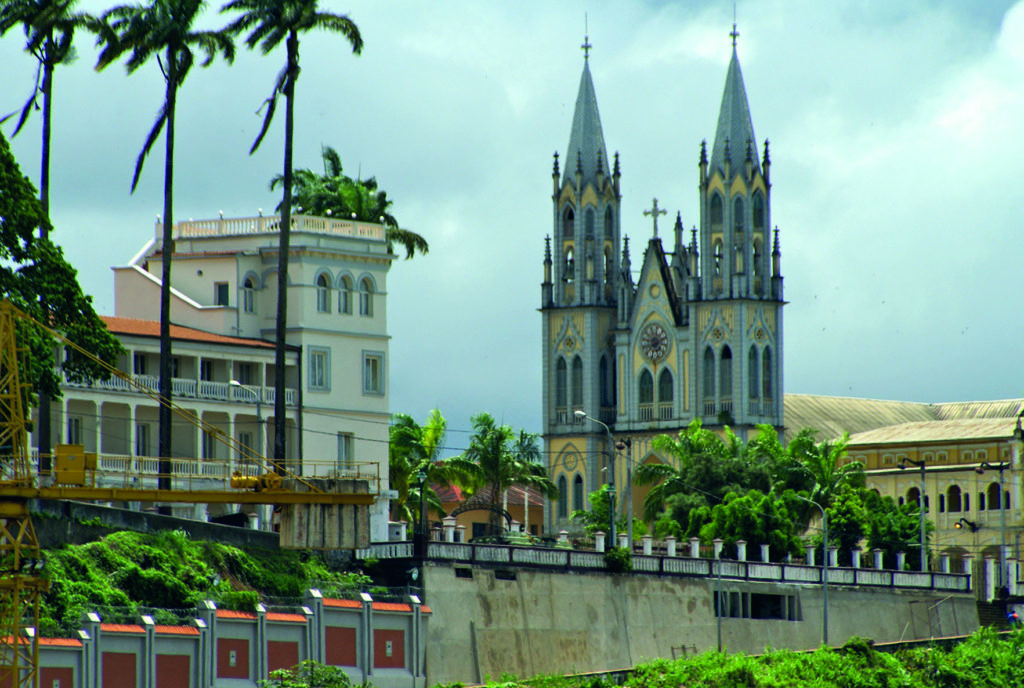
Port of Malabo, Equatorial Guinea. © Embassy of Equatorial Guinea
Despite presiding over one of Africa’s richest countries, Equatorial Guinea president Teodoro Obiang Nguema Mbasogois the very model of an African dictator
Wilson Johwa
Equatorial Guinea’s president, Teodoro Obiang Nguema Mbasogo has been in power since 1979, and is turning 75 this year. He is Africa’s, and the world’s longest- serving president. Yet few of the country’s population of one million will be celebrating.
The central African state is blighted by extreme poverty while the ruling elite, propped up by corruption and mismanagement, has control of the country’s new-found wealth, which comes from oil and gas. Even the recent fall in the oil prices, and the current global recession, do not appear to have made a difference to the largesse.
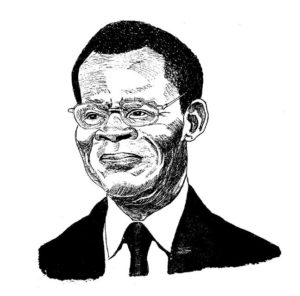
President Teodoro Obiang Nguema Mbasogo. Illustration: Vusi Malindi
Equatorial Guinea has Africa’s highest per capita income, estimated at $21,056 in 2014. This is tied to the discovery of oil in 1991, which propelled the former Spanish colony into the ranks of the continent’s top five producers. Oil and gas now account for 90% of GDP and 87% of fiscal revenues, with forestry, fisheries, farming and construction together being significant contributors to GDP. However, subsistence farming remains the main source of livelihood for the majority.
Equatorial Guinea is a place that not many have had much reason to visit, and getting meaningful information from inside the country is difficult. Fear is pervasive, to the extent that even members of the small community of development works are loath to speak.
“The country is extremely attractive and beautiful in terms of landscapes or tourist areas,” said an executive with a multinational courier company who wanted to remain anonymous. “However, the visa policy is a big constraint. Because of fear of foreigners and xenophobia, visas are issued in small quantities and are very controlled.”
Oil and gas now dwarf all activity in the country, perhaps giving reason for the president – already the continent’s longest serving non-royal head of state – to cling even more tightly to power. US oil giant ExxonMobil drills for oil in the country’s largest proven reserve, according to Tutu Alicante, who runs EG Justice, an NGO focusing on improving human rights and governance in Equatorial Guinea.
The ExxonMobil connection assumed relevance in 2017 when former CEO Rex Tillerman was short-listed for the role of US secretary of state under President Donald Trump. Apparently, Tillerman feigned ignorance when several senators raised probing questions about his tenure at the helm of the company and accused him of complicity in propping up Obiang and his inner circle, who enjoy a lavish lifestyle largely funded by malfeasance and graft.
“This lifestyle includes mega mansions, yachts, sports cars and luxury goods from around the world, as well as the vast trove of Michael Jackson memorabilia collected by Obiang’s eldest son,” says Alicante. He adds: “Remember the crystal-studded ‘Bad Tour’ glove and the ‘Thriller’ jacket? Both are now stashed in Equatorial Guinea.”
Tillerman got the job and is now the US secretary of state, joining other former top business executives in Trump’s administration. But his questioning was a rare moment in the public eye for the rulers of Equatorial Guinea, who normally manage to escape regional and international scrutiny. Their dismal record is nothing to sneer at, however.
Just under half of children of primary-school age in the country are out of school, according to UNICEF. This is despite education being both free and compulsory for children up to the age of six. Two-thirds of the population live in extreme poverty, while infant mortality rates have been compared to those of Afghanistan.
“Public hospitals lack everything, while centres built by the president himself (‘Centrod La Paz’) and his spouse (‘Clinicas Guadalupe’) are inaccessible to the ordinary public,” Wenceslao Mansogo Alo, a doctor and also an opposition leader, told Africa in Fact.
The health care system is characterised by shortages of necessary medical equipment and drugs, he said, while the lack of a health care regulatory body has left the sector subject to the whims of political influence. “There are nurses who practice like doctors and caregivers; medical graduates who pass for doctors and doctors who do not have the [necessary] level [of education] at all,” said Mansogo Alo.
“And to all this, add the poverty of the people. Someone who does not have 1,000 CFA francs to buy food will never think of going to pay for a medical consultation that can cost between 8,000 and 30,000 CFA francs,” said Mansogo Alo. “Since 2001, I have accumulated more than 30 million CFA francs in arrears from people who I am obliged to treat and who cannot pay me, whereas I am crushed myself under a debt of nearly 10 million CFA francs.”
Last year the government banned pregnant girls from attending schools, in an attempt to reduce adolescent pregnancies and boost poor educational outcomes. However, this is not likely to do much for education, which is suffering the effects of a fall in oil revenues, following the global collapse in commodity prices that precipitated a debilitating recession.
Oil and gas production in Equatorial Guinea plunged by 10% to around 165,000 barrels a day in 2015, due to falls in crude oil prices. Real GDP contracted by 8.2% in 2016 and is expected to shrink further by 5.9% in 2017. This is a far cry from average annual growth of 14.32%, from 1986 to 2015, and an all time high of 95.26% achieved in 1997.
Further falls in crude oil prices are likely, and the country’s GDP will probably continue to decline until 2020, according to African Economic Outlook, a joint publication of the African Development Bank, UNDP and OECD. This situation prompted the government in May 2015 to reduce public investment by half, making drastic cuts in its operating costs.
However the country’s parlous economic situation provides little leverage for outside powers as regards its horrendous state of governance, or its high levels of inequality and breaches of human rights. “Even at the current low rate of production … Equatorial Guinea does not need foreign aid, [which has] long since [been] cut off anyway, from the Bretton Woods institutions,” says Alicante.
High levels of corruption and mismanagement led the World Bank and the IMF to cut assistance programmes to the country in the early 1990s. Meanwhile, the country’s classification as a middle income country renders it ineligible for most donor assistance.
The country’s private sector is not a potential source of dynamism because it is vestigial at best. African Economic Outlook says its non-oil economy, “although in relative growth with respect to the rest of the economy, is nonetheless in decline”.
Doing business in Equatorial Guinea is nothing short of a “nightmare”, the courier services executive told Africa in Fact. “Once you have someone from the ‘regime’ behind you and backing your business, admin worries are unlocked,” he said. “Corruption is at its utmost. We have to pay [bribes] for everything. Manpower is very expensive, and you have very low quantity of skilled people.”
Foreign businesses are required to assign at least 30% of their equity to a local partner, but, the businessman complains, “you barely find honest people”.
However, he added that the rewards for businesses were high – if the obstacles to starting up could be successfully negotiated. “The return on investment is very quick. Margins are high because of low competition.”
Yet foreign workers in the country encounter difficulties providing quality education for their children, according to the courier sector executive. “There is no American or British school, only French and Spanish schools of doubtful quality… People generally base their families in neighbouring Cameroon or Gabon, which are only a 30-minute flight from Malabo.” But this observation does not fully account for the growing Chinese influence in Equatorial Guinea.
“Chinese companies dominate the construction and infrastructure sector,” said Alicante. “Consequently, clinics, internet cafes, food and clothing shops, and many other enterprises are now controlled by ubiquitous Chinese immigrants.”
Alicante also refers to mass arrests and deportations of African immigrants from Equatorial Guinea, ascribing this to xenophobia and discrimination. The country has been cited for widespread human trafficking of locals, for sex work and for forced labour. Some of this is blamed on foreign nationals, although the real extent of the issues does not appear to have been investigated.
However, a report by the Borgen Project, a US NGO, linked “many government officials” to involvement in the trafficking business, saying the country was one of the main hubs of human trafficking on the African continent, and that the government had done nothing to confront the problem.
Curiously, Equatorial Guinea is a member of the African Union’s African Peer Review Mechanism, a voluntary self- monitoring instrument meant to enhance governance in member states. Analyst Steven Gruzd told Africa in Fact earlier this year that the secretariat was picking up momentum after the appointment of a new CEO in January 2016.
But there are no signs that it will hold the ruler of Equatorial Guinea to account in any way. In April 2016 – some 37 years after deposing his uncle in a coup – Obiang won another term in office. The opposition boycotted the poll, citing intimidation and procedural irregularities, including the lack of an independent electoral authority, a lack of media access and harassment. The polls were announced only six weeks in advance, not – as required – 45 days before the end of the president’s term.
A 2011 constitutional amendment imposed a two-term limit on the presidential office – effective from the 2016 elections. Obiang’s control of the military allows him to exert absolute control over the judiciary, legislature and government agencies.
The country’s most pressing question, however, is about sharing the spoils arising from oil and gas, and diversifying the economic base. During the last decade, most public investment has gone into physical infrastructure, especially the power and transport sectors, leaving support for the social sector – and particularly education – lagging. Critics say there is a shortage of teachers and a disproportionate focus on secondary education.
But Alicante disagreed. “Obiang and the thugs around him have no intention, or plans, to invest in the welfare of the people any time soon,” he said. “Instead they continue to find new ways to divert the dwindling resources for their own benefit.”
However, the country has announced an ambitious plan to build a new city. The new city, Djibloho, will be built in the centre of mainland Equatorial Guinea, as part of a policy aimed at easing pressure off the main cities – Malabo, Bata, Mongomo, Ebebiyin, Evinayong and Luba, according to the African Economic Review.
The president’s advanced age means that the biggest threat to political stability in the country is the risk that he might suddenly leave office, says the Economist Intelligence Unit. Presidential ill-health or a coup could result in a destabilising power contest.
Obiang’s control of the military has allowed him to exert absolute control over the judiciary, legislature and government agencies. This is why he has been able to survive so long, given the absence of other countervailing social forces, including free media, unions, churches and NGOs, said Allicante. Any internal opposition is simply too weak to make any impact.
The president is widely regarded as intending to hand over power to his son, Teodoro Nguema Obiang Mangue (known as “Teodorin”), a notoriously profligate spender of other people’s wealth, and the vice-president of Equatorial Guinea.
Currently, the 47-year-old is facing charges of money laundering and corruption in France. In 2015 a report by the US Department of State linked him to extorting funds from timber and construction companies “through fictitious companies” and that he “fraudulently inflated public construction contracts by as much as 500%, and funnelled public money into a private bank account under his control while he served as the minister of agriculture and forestry”. Over $30 million in Teodorin’s assets, allegedly purchased with embezzled funds, was seized by U.S. authorities in 2014.
In May, a case before the High Court in Cape Town gave another glimpse of the notorious wealth of the president’s son and heir apparent. In the case, a South African businessman is seeking the attachment of Teodorin’s two Cape Town mansions following a commercial dispute. The mansions are just some of Teodorin’s international assets. His extravagant lifestyle is widely believed to be based on his easy access to the country’s coffers.
Alicante suggested that the generous oil and gas revenues flowing from the country had made Western governments and businesses, as well as other African countries “complicit in [Obiang’s] complete usurpation of power in Equatorial Guinea”.
In some authoritarian countries, social media activism has provided a means for people to organise, as for instance in Zimbabwe. However, internet penetration in Equatorial Guinea is insignificant. In any case, many citizens are afraid of the consequences of being caught discussing the “wrong” subject online, Alicante said. It doesn’t help that the country’s main telecommunications companies are owned by members of the presidential clique.
In the courier executive’s experience, internet connectivity in the country is good, but subject to the whims of a corrupt bureaucracy. “The government can decide at any time to suspend signals when it thinks a social network could impact its power,” he said.
However, the lack of an adequate education system is perhaps Obiang’s most glaring legacy, and it will condemn the country to penury long after he has gone.
“Young people in need of training are in total despair,” said Mansogo Alo. “If their parents cannot afford to send them to further their studies abroad, they are condemned to live in the country, enlist in the army or enrol in a public university that can hardly be called a university.”
He added that in Equatorial Guinea, education has little or no relationship to employment anyway. “Obiang and his clique don’t like educated people. The only time you are sure to get a job is when you belong to the [ruling] party.”
Wilson Johwa researched the applicability of the South East Asian developmental state model to South Africa as part of his MA at the University of the Witwatersrand, to answer his life-long curiosity as to why some countries achieve economic growth while others never do. Zimbabwe-born, he is currently news editor (digital) at Business Day, South Africa’s influential daily newspaper.

